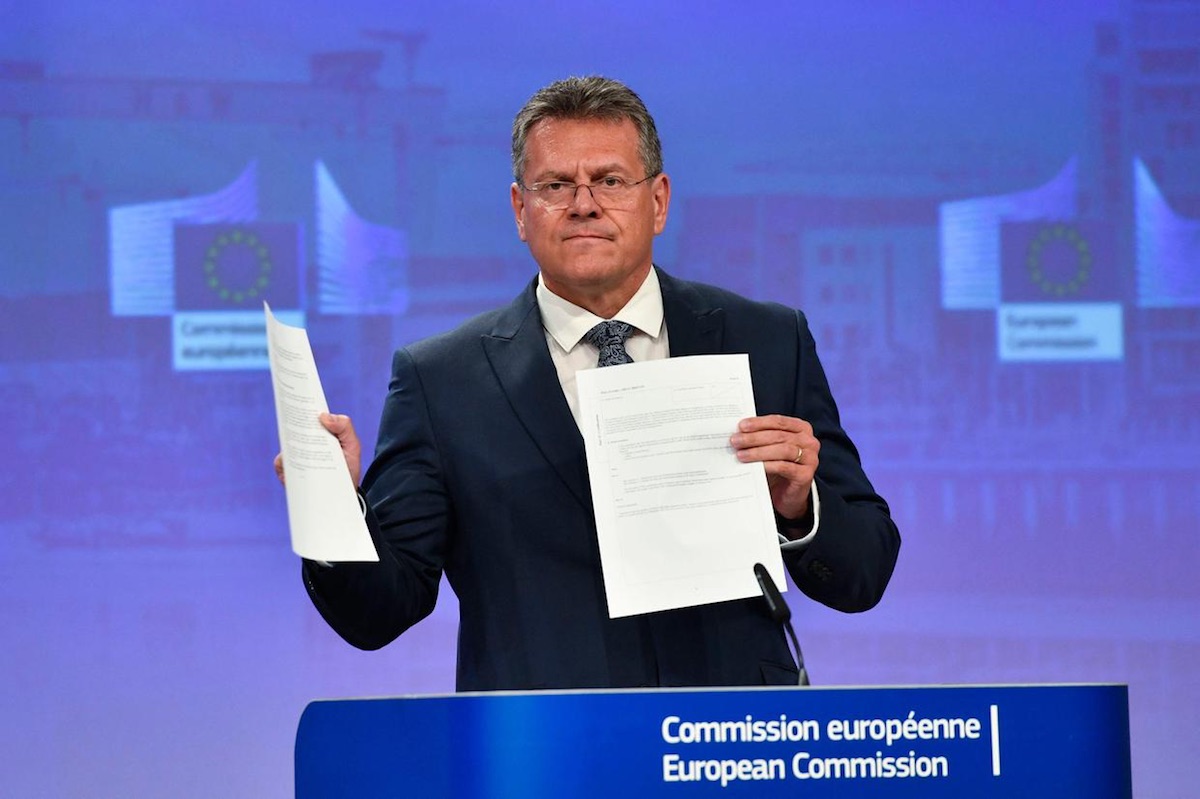
The European Commission has begun two new legal proceedings against Britain after it introduced legislation to override the Brexit Withdrawal Agreement in regard to the north of Ireland, and resumed another challenge it had previously paused.
European Commission vice president Maroš Šefčovič (pictured), who oversees EU relations with Britain, said there was no justification for unilaterally reneging on an international agreement.
“Let’s call a spade a spade. This is illegal,” he told a news conference.
The three legal proceedings do not relate to Britain’s new plans, but to Britain’s failure to implement the agreed procedures for trading in the north of Ireland.
“We decided that our response should be measured, should be proportionate. And we are offering not only legal action here today but we’ve been fleshing out what concretely we could do,” he said.
Brussels also offered what it called an “oven-ready” solution to the impasse, with drastically reduced paperwork for traders across the Irish Sea, and said it would allow two months before taking Britain to the European Court of Justice.
The Protocol Bill introduced at Westminster on Monday is more extreme and far-reaching than anticipated, empowering British ministers to unilaterally scrap the protocol almost in its entirety.
It allows ministers to rewrite all of the deal previously agreed by London apart from commitments to the Common Travel Area, North-South co-operation and human rights.
The bill offers no basis for negotiation with the European Union. It is widely believed that British Prime Minister Boris Johnson is seeking to generate as much crisis as possible in order to detract from his own domestic political failures.
Several members of the US Congress have issued statements warning about the consequences of ripping up the protocol, warning that an “irresponsible” Johnson is putting the entire peace process at risk.
A group of representatives from the bipartisan Congressional Friends of Ireland group released a statement warning that the move could jeopardise almost 25 years of peace established by the Good Friday Agreement, a statement echoed by Bob Menendez, the Democratic chair of the Senate foreign relations committee.
Tánaiste Leo Varadkar said that recent actions of the British government “were not the actions of a trustworthy government”.
“It’s not right what they’re doing.” The protocol was a legal document, and the British government should honour its international obligations, he said.
Mr Varadkar said he thought it was a mistake to introduce legislation, as the protocol as it had been written was open to modification.
The “vast majority” of Assembly members in Belfast did not want the London government to have the power to override the wishes of the people of the North, he added.
Sinn Féin Brexit spokesperson Declan Kearney said the EU had little choice but to respond given the British government’s “reckless unilateral actions”.
“The unilateral actions of the Johnson administration are an act of bad faith that have not only caused deep mistrust with international partners but have raised significant worry and stress across the business community here in the north,” he said.
Sinn Féin’s First Minister-elect Michelle O’Neill said there are “ways to smooth the protocol” but that needs to be done in an agreed fashion between the EU and the British government.
“The Boris Johnson approach of running roughshod over the protocol, undermining the protocol, undermining the Good Friday Agreement, undermining political stability is just not acceptable and it is not the way to go,” she said.
“Boris Johnson’s Bill is unilateral action, it is breaching international agreements, it is running a coach and horses over the protocol that they themselves signed up to. There is only one bad faith player in the middle of this Brexit debacle and that is Boris Johnson and the Tory party.”
Ms O’Neill said the EU have always been “very pragmatic”.
“They have understood more than the Tories in London the need to protect the Good Friday Agreement,” she said.
“That pragmatism is what we need to see in terms of what needs to happen next. An agreed way forward is the only way forward.
“This approach of Boris Johnson is just reckless, it is dangerous and it creates even more economic uncertainty.
“If you were a local company who wants to sell into the European market for the future, that investor will think twice because of the uncertainty here.
“So Boris Johnson is jeopardising jobs here, all for what is going on within the Tory party. Boris Johnson and the Tories will never act in the interests of people here.”
Amid considerable political uncertainty, Johnson may now be too weak to dictate any significant change or compromise on the legislation. Instead, a further attack on the 1998 Good Friday peace Agreement is likely as hardline Tories are targeting the European Convention on Human Rights and the court which interprets it.
A new British policy to deport all refugees to Rwanda ended in predictable disarray this week when legal interventions blocked the first flight of deportations. This is being used to push for Britain’s withdrawal from the ECHR by Tories attacking “lefty human rights lawyers”.
Under the Good Friday Agreement, the ECHR plays a major role in guaranteeing human rights in the north of Ireland.
Political commentator Andrew Marr said the two issues of the ECHR and the Protocol had been deliberately “merged” in English politics ahead of two by-elections next week.
“All that stuff about borders and refugees has now got bundled together into a new row between British ministers and this is - and let’s put this gently - convenient for Boris Johnson, who is facing two by-elections next week in Wakefield and Tiverton.
“Lose both and his position inside the Tory party wobbles again. But hold one or the other and he’s safe, I think, through the summer.”
![[Irish Republican News]](https://republican-news.org/graphics/title_gifs/rn.gif)
![[Irish Republican News]](https://republican-news.org/graphics/title_gifs/harp.gif)

